Hundreds of thousands of people are demanding a different health policy from the president of the Community of Madrid, Isabel Díaz Ayuso. The massive demonstration for public health is the second important warning that the citizens of Madrid have launched in three months.
A group of pensioners chanted “Cutting back on health care is a criminal act” during the demonstration in Madrid in defence of public health care. These six words sum up the feelings of the hundreds of thousands of people – a quarter of a million, according to the Government Delegation and more than a million according to the organising organisations, who have verified the occupation of 350,000 square metres – who supported the demonstration. 350,000 square metres – who have supported the call from the four columns – leaving from 12:00 from Legazpi (South), Hospital de la Princesa (East), Plaza España (West) and Nuevos Ministerios (North) – that have converged in the Plaza de Cibeles with the intention of surpassing the overflow that already occurred on 13 November in the first major demonstration against the health policy of the president of the Community of Madrid, Isabel Díaz Ayuso. “We are patients, we are not clients” is another of the key phrases, with a crystal-clear message, which was chanted at the march, called by more than 70 groups under the slogan “Madrid stands up and demands public health and solutions to the Primary Care Plan”.
Three months after, Ayuso has received a second important warning from the citizens of Madrid, who wanted to support the Primary Care health professionals who have been on an indefinite strike for nine weeks to desaturate schedules that reach 70 patients a day. A historic strike, accompanied by a medical lockout in the offices of the Regional Ministry, and tinged by a constant distancing between the proposals of the strike committee and the postulates of Ayuso’s government, for whom increasing funding in a way that meets the demands of the professionals is not among her plans.
 View Demonstration for public health on 12 February 2023 in Madrid ÁLVARO MINGUITO
View Demonstration for public health on 12 February 2023 in Madrid ÁLVARO MINGUITO
Antonia, a resident of Coslada, says she has taken part in the demonstration “for health and for everything, because Ayuso is leaving Madrid”. She highlights as reasons for protesting “the waiting lists, and the fact that they don’t attend as they should”, but also points to a wolf whose ears are becoming more and more visible: “Privatisation is there, that’s what they want”.
Another protester, Vanessa, says that she had been scheduled to have hip surgery since before the pandemic and that it finally took place in October 2022. “The essential thing is that everyone has the right to universal, quality public health care, because that’s why we pay for it,” she says.
Paco, an auxiliary nurse, was on the front line during the pandemic and he has also been on the front line today. His diagnosis, shared by the thousands of people who have demonstrated, is that “there is a lack of doctors, nurses, there is not enough primary care”.
Sonia Carmona is a family doctor at a health centre in Parla and admits that in her surgery she does not work, but rather dispatches. “We feel very bad about this way of working, why less than to demand that we have the necessary minutes to be able to attend to patients with dignity, as they deserve”. She explains that the Community of Madrid refuses to invest what is necessary to improve the conditions in which primary care professionals work.
In some parts of the city, such as Plaza de Legazpi, from where the southern column started, or Neptuno, there were tense scenes because the police had not closed the traffic at 12:15 and the demonstrators had to do it themselves.
In the Plaza de Cibeles, the final point of the demonstration, a communiqué was read out requesting a 25% investment in primary care. Mar Noguerol, a family doctor in charge of reading the manifesto, asked her “why they don’t want strong primary care, what their model is”. In the text, the organising organisations denounced the fact that the health policy of the Community of Madrid is “aimed at guaranteeing the profits of companies and health lobbies, instead of being focused on caring for all people and guaranteeing our right to health” and pointed out that in the three months between the two demonstrations “the deterioration has grown exponentially”. Noguerol quoted Don Quixote to assure that “for primary care and public health care we can and must risk our lives”, before saying goodbye and thanking all those who came to Madrid to attend.
In the run-up to the demonstration, the manoeuvres of the Madrid authorities to minimise its impact were striking. The City Council, arguing that it was Sunday, prevented photojournalists from accrediting themselves and gaining access with their equipment to the terrace of the Palacio de Cibeles, from where panoramic views of the city centre can be taken. And on Saturday in Carabanchel, four municipal police officers fined several people handing out leaflets with information about the demonstration, in violation of article 1. 3 of the Regulatory Ordinance on Outdoor Advertising in Madrid, which states that outdoor advertising activities carried out by “non-profit organisations, political parties and other neighbourhood and associative organisations to inform, disseminate and promote their own acts of a social, political, cultural, citizen participation, promotion of civic values and humanitarian behaviour, social awareness and sensitisation and the like” are exempt from this regulation.
After almost 30 years of government by the Partido Popular, the figures for Madrid’s healthcare system are not very encouraging. On the one hand, Madrid is the region that invests the least in health per capita. According to a report by the Federation of Associations for the Defence of Public Health (FADSP) which analyses the health budgets for 2023, Madrid is bottom of the list with 1,446.13 euros per inhabitant, despite being the region with the highest GDP, far from the 2,133.13 euros of Asturias or the 2,130 euros of the Basque Country.
On the other hand, it continues to be the region that allocates the least money to primary care. Thus, in the budgets for 2023, extended in the absence of political agreement, this region continues to allocate 10.7% of total health spending to this level of care, far from La Rioja, which allocates 18.33% or Cantabria, with 17.94%, and also far from the state average of 15%. And light years away from the recommendations of the World Health Organisation, which advises allocating 25% to this level of care.






